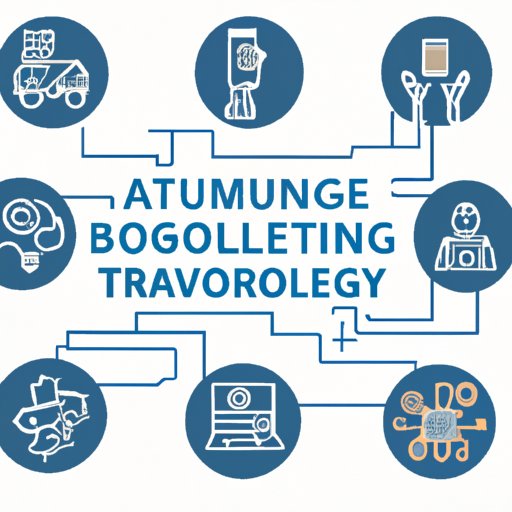Introduction – What is Emerging Technology and Why is it Important?
As technology continues to rapidly evolve and expand, understanding the latest advances in emerging technologies is becoming increasingly important. From automation and robotics to artificial intelligence (AI) and cloud computing, these innovative developments have the potential to revolutionize many industries and aspects of everyday life. But what does emerging technology mean and why is it important to understand?
Exploring Emerging Technologies: What Does it Mean?
In general terms, emerging technology is any new or developing technology that has the potential to significantly impact society and industry. It is often characterized by its novelty, complexity, and potential to disrupt existing systems and processes. Understanding the implications of emerging technologies is essential for both individuals and businesses looking to stay ahead of the curve.
At a more technical level, emerging technologies are defined as “advanced technologies that are currently under development but which have the potential to be widely adopted and used in the near future.” This includes developments such as autonomous vehicles, the Internet of Things (IoT), augmented reality (AR) and virtual reality (VR). These technologies are being developed at an ever-increasing rate, with new innovations appearing every day.
Emerging technologies can be divided into four main categories: information, communication, automation and robotics, and artificial intelligence (AI). Each of these areas has the potential to revolutionize the way we live and work, from increasing efficiency and productivity to transforming the customer experience.
A Primer on the Latest Advances in Technology
The latest advances in technology are having a profound impact on our lives, from consumer products to the workplace. Here is a look at some of the most significant emerging technologies:
Examples of Emerging Technologies
Information technology: The emergence of big data, blockchain, and other forms of digital technology are transforming the way businesses and consumers interact. Big data offers insights into customer behaviour and preferences, while blockchain provides a secure way to store and transfer data. Meanwhile, the Internet of Things (IoT) connects devices and systems, allowing them to communicate with each other.
Communication technology: 5G networks are set to revolutionize the way we communicate, with faster speeds, lower latency, and greater capacity. Meanwhile, voice recognition technology is making it easier to interact with devices and services. And augmented reality (AR) is bringing a new level of immersion to gaming, education, and entertainment.
Automation and Robotics: Automation is transforming the manufacturing sector, with robots taking over repetitive and hazardous tasks. Meanwhile, self-driving cars are set to revolutionize transportation, with the potential to reduce traffic congestion and improve safety.
AI and Machine Learning: AI and machine learning are enabling computers to learn from data and make decisions without human intervention. This technology is being used to automate processes, generate insights, and improve customer experiences.
Cloud Computing: Cloud computing is transforming the way businesses store and access data, with the ability to scale up quickly and reduce costs. This technology is also driving the development of new applications and services.
The Impact of Emerging Technologies on Everyday Life
The impact of emerging technologies on everyday life is far-reaching. Automation and robotics are changing the way we work, with robots taking over mundane tasks and freeing up humans to focus on more complex and creative tasks. Meanwhile, AI and machine learning are powering applications and services that are revolutionizing industries and transforming the customer experience. Cloud computing is making it easier to store, share, and access data from anywhere in the world.
But it’s not just businesses that are benefiting from these advanced technologies. Consumers are also reaping the rewards of these developments, from smart home appliances that make life easier to virtual assistants that can answer questions and offer advice. As these technologies become more widespread, they will continue to shape our lives in ways we can only imagine.

Examining the Benefits and Challenges of Emerging Technologies
While there are many benefits associated with emerging technologies, there are also some challenges. Here is a look at the advantages and disadvantages of these advanced technologies.
Advantages of Emerging Technologies
One of the main benefits of emerging technologies is increased efficiency. Automation and robotics are reducing the amount of time it takes to complete certain tasks, freeing up employees to focus on more complex tasks. AI and machine learning are being used to automate processes and generate insights, while cloud computing is making it easier to store and access data.
These technologies are also helping to drive innovation. By providing businesses with access to vast amounts of data, they are able to develop new products and services more quickly. In addition, they are enabling companies to better understand their customers and anticipate their needs, leading to improved customer experiences.
Disadvantages of Emerging Technologies
The downside of emerging technologies is that they can create disruptions in the workplace. Automation and robotics are replacing some jobs, while AI and machine learning are eliminating the need for certain skills. This can lead to job losses and income inequality. In addition, the use of personal data for commercial purposes can raise privacy concerns.
How Businesses Can Leverage Emerging Technologies
Businesses can leverage emerging technologies to increase efficiency and reduce costs. Automation and robotics can streamline processes and eliminate manual labor, while AI and machine learning can automate tasks and generate insights. Cloud computing can help businesses store, share, and access data from anywhere in the world.
To successfully implement these technologies, businesses need to develop strategies that align with their goals. This could include investing in training and development to ensure employees are equipped with the necessary skills, or partnering with external providers to access the latest technologies. It is also important to consider the potential risks associated with the technology and take steps to mitigate them.

Understanding the Potential of Emerging Technologies for Society
The potential of emerging technologies to transform society is immense. Automation and robotics are improving safety and efficiency, while AI and machine learning are unlocking new opportunities in healthcare, education, and other areas. Cloud computing is making it easier to access and store data, while 5G networks are revolutionizing communication.
But there are also potential risks associated with these technologies, from job losses and income inequality to privacy concerns. To ensure that these technologies are used responsibly and for the benefit of society, it is important to consider the ethical implications of their use and ensure that appropriate safeguards are in place.

Conclusion – Embracing the Benefits of Emerging Technologies
Emerging technologies are transforming the way we live and work, from automation and robotics to AI and machine learning. These technologies have the potential to revolutionize many industries and aspects of everyday life, from increasing efficiency and productivity to transforming the customer experience. Businesses can leverage these technologies to increase efficiency and reduce costs, while society as a whole can benefit from the social impact of these advances.
Summary of Key Points
• Emerging technology is any new or developing technology that has the potential to significantly impact society and industry. It can be divided into four main categories: information, communication, automation and robotics, and AI.
• Examples of emerging technologies include big data, blockchain, 5G networks, voice recognition, AR, VR, automation, robotics, AI, and machine learning.
• The impact of emerging technologies on everyday life is far-reaching, from increasing efficiency and productivity to transforming the customer experience. There are both advantages and disadvantages associated with these technologies.
• Businesses can leverage emerging technologies to increase efficiency and reduce costs, while society as a whole can benefit from the social impact of these advances. It is important to consider the ethical implications of their use and ensure that appropriate safeguards are in place.
Final Thoughts on the Importance of Emerging Technologies
Emerging technologies are revolutionizing the way we live and work, offering tremendous potential for businesses and society as a whole. Understanding the implications of these advances is essential for staying ahead of the curve and leveraging the benefits of these technologies. As these technologies continue to evolve, it is important to remain aware of the potential risks and ensure that appropriate safeguards are in place.
(Note: Is this article not meeting your expectations? Do you have knowledge or insights to share? Unlock new opportunities and expand your reach by joining our authors team. Click Registration to join us and share your expertise with our readers.)
